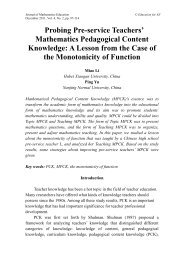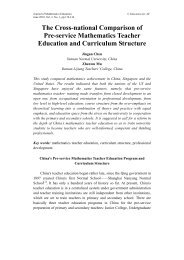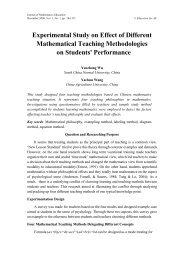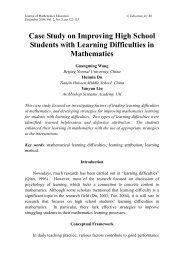Gender Issues in Mathematical Textbooks of Primary Schools
Gender Issues in Mathematical Textbooks of Primary Schools
Gender Issues in Mathematical Textbooks of Primary Schools
You also want an ePaper? Increase the reach of your titles
YUMPU automatically turns print PDFs into web optimized ePapers that Google loves.
Hengjun Tang, Bifen Chen, & Weizhong Zhang 113<br />
<strong>in</strong> solv<strong>in</strong>g identical problems. Meanwhile, we must unfold the situation that<br />
students learn from other students to make up their own <strong>in</strong>sufficiency.<br />
In brief, the gender equality is one <strong>of</strong> the important aspects <strong>of</strong><br />
educational fairness, and education is the primary factor <strong>in</strong> form<strong>in</strong>g children’s<br />
gender roles. Therefore, we need to cultivate an educational environment for<br />
students which convey gender equality. The most important th<strong>in</strong>g is that<br />
mathematics teachers and textbook editors should pay attention and reflect<br />
gender issues <strong>in</strong> the current textbooks.<br />
References<br />
Benbow, C. P. (1992). Academic achievement <strong>in</strong> mathematics and science <strong>of</strong><br />
students between ages 13 and 23: Are there differences among students <strong>in</strong><br />
the top one percent <strong>of</strong> mathematical ability? Journal <strong>of</strong> Educational<br />
Psychology, 84(l), 51-61.<br />
Fan, W., & Li, W. (2008). Commentary on researches <strong>of</strong> gender differences <strong>of</strong><br />
mathematics study <strong>in</strong> western. Comparative Education Review, 9, 77-82.<br />
Geary, D.C., Sauzts, S.J., & Liu, F. (2000). Sex difference <strong>in</strong> spatial cognition,<br />
computational flueney, and arithmetical reason<strong>in</strong>g. Journal <strong>of</strong><br />
Experimental Child Psychology, 77, 337-353.<br />
Brandell, G., Leder, G. & Nystrom, P. (2007). <strong>Gender</strong> and mathematics :<br />
Recent development from a Swedish perspective. ZDM, 39, 235-250.<br />
Hyde, J. S., Fennema, E., & Lamonj, S. J. (1990). <strong>Gender</strong> differences <strong>in</strong><br />
mathematics performance. Psychological Bullet<strong>in</strong>, 107, 299-324.<br />
Kimball, M. M. (1989). A new perspective on women’s math achievement.<br />
Psychological Bullet<strong>in</strong>, 104, 53-69<br />
Li, S. (2001). Psychology <strong>of</strong> mathematics education (pp.237, 232). Shanghai:<br />
East Ch<strong>in</strong>a Normal University Press,<br />
L<strong>in</strong>g, S. (2006). Reason analysis <strong>of</strong> the gender differences <strong>in</strong> mathematics.<br />
Social Sciences <strong>of</strong> Guangxi, 8, 164-167.<br />
Maeeoby, E., & Carol, J. (1974).Psychology <strong>of</strong> sex differences. Stanford, CA:<br />
University Press.<br />
Shi,, J. (2004). Enter<strong>in</strong>g gender world <strong>of</strong> the textbooks and teach<strong>in</strong>g. Beij<strong>in</strong>g,<br />
Science <strong>of</strong> education Press, 11, 290.<br />
Zhang, X.(2006). Commentary on researches <strong>of</strong> gender differences <strong>of</strong> middle<br />
school students’ mathematical skill. Journal <strong>of</strong> Tanj<strong>in</strong> Normal University<br />
(Basic education edition), 7(2), 44-47.







